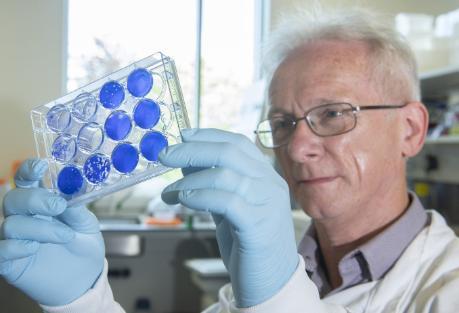The McLauchlan Group
My group is interested in the virus-host interactions that promote or restrict virus infection and lead to disease. We also examine RNA virus evolution, diversity and transmission dynamics. We investigate these topics in the context of hepatitis C virus (HCV) and dengue virus (DENV), two viruses that are closely related genetically but which cause very different diseases.
HCV typically establishes a chronic infection that can lead to the development of life-threatening liver disease, including liver cancer. How the virus causes liver disease is not fully understood but is linked to the host response to infection. We study the host factors that may limit the replication of the virus using cell-based models and then examine how this may be connected to host response to infection in the liver. Moreover, effective anti-HCV treatments called direct-acting antivirals are now available with cure rates of 95% for the most common HCV strains found in the UK. An important question that we address is whether these therapies are also effective against other strains of the virus worldwide. In addition, HCV encodes an error-prone RNA polymerase, and therefore HCV infection typically comprises a population of closely-related but genetically different viruses termed quasispecies. The large genetic diversity contained within a quasispecies population allows rapid adaptation to environmental and genetic pressures in the host (e.g. immunological pressures) so that they can, for instance, develop resistance to antiviral compounds and escape host immune defences.
DENV is endemic in most tropical regions of the world. It is transmitted by mosquitoes and can cause hemorrhagic fever, a rare but fatal condition. The annual outbreaks can overwhelm the healthcare systems in some countries due to an inability to effectively diagnose cases of DEV infection and predict who may develop serious complications. Our studies are aimed at i) improving the diagnostics of DENV infection in real world settings and ii) determining host and viral factors in blood samples (biomarkers) that predict the different categories of DENV-associated disease with the objective of establishing prognostic tests.
Current Research
My research focuses on these key questions:
1) What are the host factors induced by HCV infection that may limit replication of the virus?
We have utilised high-throughput platforms to identify species-specific host responses triggered by interferon that may disrupt or inhibit HCV infection.
2) Which strains of HCV may not respond optimally to novel DAA treatments?
Our focus has primarily been on determining viral sequences of HCV strains in Africa and China that have not been extensively studied for their response to DAA therapy.
3) Where are the possible hubs or sources of HCV that have spread in the UK population?
Using data and samples collected from a national cohort established by HCV Research UK, we are examining the genetic evolution of the most prevalent HCV strains found in the UK and their geographical distribution over time. To learn more about HCV Research UK, please visit the website on Enlighten.
4) What are the optimal approaches for diagnosing DENV infection by high-throughput sequencing?
Through a collaborative project conducted by Majo Galarion, a post-graduate student co-supervised with Dr Ana Filipe, we are developing the use of high-throughput sequencing methods for diagnosing individuals with DENV infection or other viral infections that mimic the disease characteristics of DENV.

Group members
|
John McLauchlan |
Dr Sarah McDonald |
Majo Galarion |





